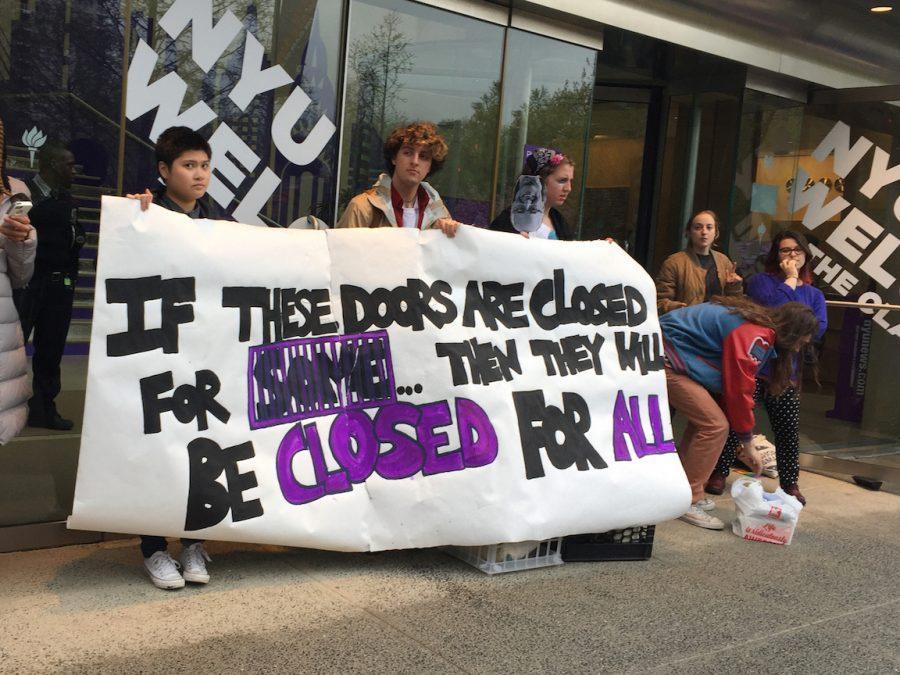IEC Continues Fight to #AbolishTheBox
During Weekend on the Square, the Incarceration to Education Coalition protested in front of Kimmel, gaining the attention of the university and prospective students. IEC aims to remove the checkbox on college applications to indicate whether the applicant has been convicted of a crime.
April 25, 2017
The Incarceration to Education Coalition at NYU protested outside the Kimmel Center for University Life NYU’s Weekend on the Square to further push the university to #AbolishTheBox.
The Abolish the Box movement aims to remove the checkbox present on many college applications that requires applicants to indicate whether they have been convicted of a crime.NYU’s Common Application features a disclaimer indicating that the university will disregard any information about an applicant’s general criminal and disciplinary history because that history does not give any real detailed portrait about that person. However, NYU has modified its application to include a question specifically about violent crimes.
The application question asks if the applicant has been convicted at trial or pleaded guilty to a criminal offense involving physical force or the threat of physical force, violence, sexual offense, possession of a weapon, kidnapping, arson or any other offense which caused physical harm to another person within the last seven years after the age of 14.
For the 2016-2017 admissions cycle, NYU began to implement a “Box Blind” first reading of applications in which admissions officers are not provided any information about an applicant’s potential criminal history.
If the applicant surpasses this step of the process, their disciplinary history is taken into account by a Special Committee Review group that requests more information and allows the applicant to explain their experience more fully. However, members of the IEC are still unsatisfied with the university’s process.
In a statement to Time, the university said that it is attempting to continue its goal of being a catalyst for social progression through the Box Blind initiative.
“We have been constantly working to seek a balance between two principles: keeping our campus safe and ensuring that NYU gives people a second chance and lives up to its mission as an engine of social mobility,” MJ Knoll-Finn, NYU Vice President for Enrollment Management, said according to Time.
Sheba Rivera, an organizer with the IEC and a graduate student in the Robert F. Wagner Graduate School of Public Service, believes that it is important to abolish the box and that the reasoning behind including the box is classist, racist, heterosexist and ableist. She also said that it is fully within the university’s power to end the practice of including the box on its application.
“[NYU has] a duty to acknowledge that people who have been incarcerated do not make our classroom dangerous, but can bring gifts such as ambition and perseverance,” Rivera said. “[Banning the box] is humane and responsible as well as supported by research.”
Another IEC organizer, CAS sophomore Amethyst Davis, said that there is a disproportionate number of incarcerated minorities.
“Disproportionately, those checking the box are black and brown bodies who’ve been ushered into the prison-industrial complex due to racist policies like the War on Drugs,” Davis said.
The IEC believes that the box is motivated by a false belief that those who have been convicted of violent crimes will be a dangerous presence on college campuses. The group disagrees with this sentiment. Some organizers within the IEC have even had personal experiences to the contrary.
Gallatin sophomore Joseph Taecker-Wyss, an IEC organizer, cited his experience tutoring 16- and 17-year-old students at Rikers Island Jail as his motivation to join the coalition.
“I think of the teenage boys I worked with at Rikers,” Taecker-Wyss said. “These students are exceptionally smart — many understand complex math problems better than I.”
Taecker-Wyss also said that he believes these students are unfairly judged by the university because of the presence of the box on NYU’s application.
“They have so much to offer our society and would be great additions to the student body of New York University,” Taecker-Wyss said. “Unfortunately, our university thinks that whatever mistake these kids made as teens makes them a danger to the student body. Instead of shrinking the gap between poor communities of color, who are disproportionately affected by the box, and the affluent and white students at NYU, our university widens it.”
Email Deanna Tran at [email protected].















































































































































